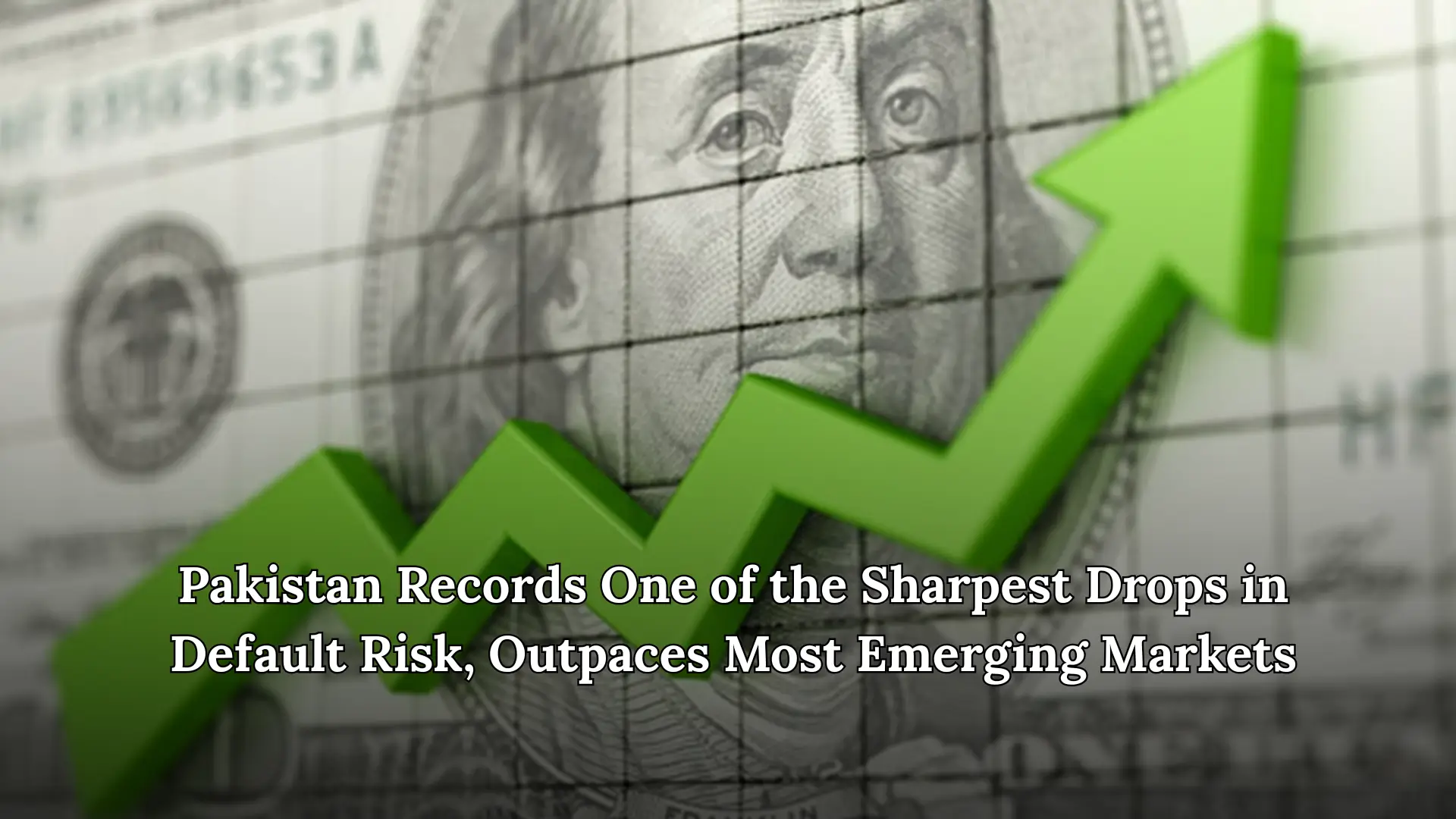Pakistan Records One of the Sharpest Drops in Default Risk, Outpaces Most Emerging Markets. Pakistan has recently emerged as a standout performer among global emerging markets, recording one of the sharpest declines in sovereign default risk over the past 15 months, according to the latest data from Bloomberg. This development reflects growing investor confidence in Pakistan’s economic management and sets the country apart as a noteworthy example in the emerging market universe.
Pakistan Emerges as a Top Performer
Adviser to the finance minister, Khurram Schehzad, highlighted on Sunday that Pakistan is now the second most improved economy worldwide in terms of reduced default probability, as measured by Credit Default Swap (CDS)-implied metrics. A Credit Default Swap-implied probability measures how likely it is that a borrower, whether a company or a country, will fail to repay its debt. This measure is derived from the market price of a CDS, which functions as a type of financial insurance that investors use to protect against the risk of default, as noted by the International Monetary Fund (IMF).
Understanding CDS and Default Probability
When the price of a CDS decreases, it signals that investors perceive the borrower as less risky. Therefore, the sharp drop in Pakistan’s CDS-implied probability indicates that global investors now consider the country significantly less likely to default on its debt. From June 2024 to September 2025, Pakistan’s default probability has declined by a remarkable 2,200 basis points. This reduction represents the largest drop among major emerging markets and positions Pakistan just behind Turkey in the global rankings for default risk reduction, according to Schehzad.
Consistent Improvement Compared to Other Emerging Markets
Pakistan is the only country in the emerging market sample to demonstrate consistent, quarter-on-quarter improvement over the past year. This contrasts with other economies, such as South Africa and El Salvador, which recorded smaller reductions in default risk, while countries like Argentina, Egypt, and Nigeria experienced increases. The consistency of Pakistan’s progress underscores the effectiveness of its macroeconomic policies and financial management strategies.
Key Factors Behind Pakistan’s Decline in Default Risk
The Adviser attributed this sharp improvement to several factors:
- Macroeconomic Stabilization: Maintaining fiscal discipline and controlling inflation.
- Structural Reforms: Ongoing reforms to strengthen the financial system.
- Timely Debt Servicing: Making payments on obligations on schedule.
- IMF Program Commitment: Adherence to agreed programs and targets.
- Positive Rating Actions: Upgrades from S&P, Fitch, and Moody’s.
These measures have strengthened Pakistan’s fiscal position and gradually rebuilt market credibility.
Investor Confidence and Market Perception
“This sharp decline in risk signals strengthening investor confidence in Pakistan’s economic management and policy direction,” said Schehzad. He added that the country is steadily regaining its market credibility and stands out as one of the most improved sovereign credit stories in the emerging market universe. The clear message to investors is that Pakistan’s consistent economic progress is creating a more secure and predictable investment environment.
Why CDS Matters for Investors
Credit Default Swaps are widely used by investors to gauge risk levels in the market. The CDS-implied probability is a forward-looking indicator, reflecting real-time sentiment about a borrower’s ability to meet debt obligations. For Pakistan, the substantial decrease in CDS prices reflects an increasing trust among global investors that the country is managing its fiscal and monetary policies effectively. This shift in perception is crucial for attracting foreign investment, as reduced default risk lowers the cost of borrowing and enhances the appeal of the local market.
Pakistan’s Recovery Amid Global Challenges
Pakistan’s improvement is not just in numbers; it represents a broader narrative of recovery and resilience. Amid global economic uncertainties and pressures on emerging markets, Pakistan has maintained a disciplined approach to debt management. By adhering to its IMF program, making timely payments on its obligations, and implementing structural reforms, the country has created a more stable financial environment. These steps have played a pivotal role in reducing sovereign risk and improving the perception of Pakistan’s economy among international investors.
Comparison with Other Emerging Economies
Other emerging markets have faced contrasting outcomes. While some, like South Africa and El Salvador, have managed moderate reductions in default risk, several others have experienced heightened vulnerability. Countries such as Argentina, Egypt, and Nigeria saw rising CDS-implied probabilities, signaling increased concern among investors about potential defaults. In this context, Pakistan’s consistent improvement is particularly noteworthy and positions it as a model for effective sovereign risk management.
The Role of Policy Discipline and Structural Reforms
Financial experts point out that Pakistan’s journey reflects the importance of coordinated policy action, structural reforms, and proactive engagement with international financial institutions. The combination of fiscal discipline, strategic debt management, and adherence to reform programs has directly contributed to lowering default risk. Moreover, positive assessments from rating agencies act as a reinforcing mechanism, signaling credibility and stability to global markets.
Implications for Investment
The implications of this decline in default risk are significant. Lower perceived risk attracts more foreign investment, reduces borrowing costs, and enhances the overall economic outlook. Investors are increasingly looking at Pakistan as a promising market with potential for growth and profitability. By consistently improving its economic fundamentals, Pakistan is not only securing its position in the emerging market landscape but also sending a message that disciplined policy and structural reforms yield tangible results.
Conclusion
Pakistan’s remarkable drop in sovereign default risk over the past 15 months positions it as one of the most improved economies globally. The combination of macroeconomic stabilization, structural reforms, timely debt servicing, and adherence to the IMF program has led to a reduction of 2,200 basis points in CDS-implied probability, the sharpest decline among major emerging markets.
Positive ratings from agencies like S&P, Fitch, and Moody’s reinforce this improvement and highlight growing investor confidence. Pakistan’s consistent progress demonstrates resilience and effective economic management, making it a key market to watch in the emerging market universe. The country’s story is a clear signal to investors that Pakistan is steadily rebuilding credibility, reducing risk, and creating a secure environment for sustainable investment.
















